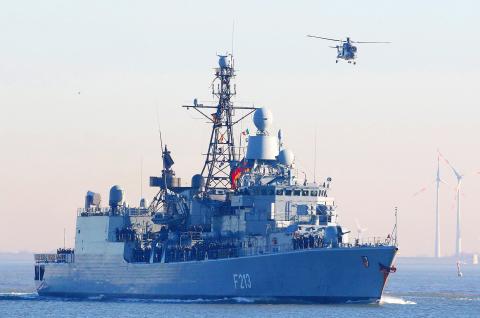German warships could be sent through the Taiwan Strait to challenge Beijing’s claims over international waterways, which would mark a departure of Germany’s decades-long non-confrontation policy, US media outlet Politico’s European branch said yesterday.
German officials last week confirmed, after discussing the issue with the German Federal Ministry of Defense, that such plans were being considered, said an article by John Vinocur, former executive editor and vice president of the International Herald Tribune.
Should the administration of German Chancellor Angela Merkel go ahead with the plan, Germany would be challenging the French opinion that Germany is running a “non-combat army” while openly backing allies, Vinocur said.

Photo: EPA-EFE
However, the plan would be provocative to those in Germany who favor non-aggression, he said.
Vinocur cited as examples of Germany’s reluctance to engage in conflicts the withdrawal of its navy from the combat zone during the Libyan intervention in 2011, caveats on its troop deployments in Afghanistan and its decision not to directly participate in attacks on the Islamic State group in Syria — unlike its NATO neighbors Belgium, the Netherlands, Denmark and France.
Reasons to go ahead with the plan would include improving US-German relations — especially after a recently announced six-month suspension to US tariffs on German vehicles — and one-upping France, which claims to have the only functioning military in the EU, Vinocur said.
France in April sent a frigate through the Taiwan Strait, which was shadowed by the Chinese military and resulted in Beijing lodging official protests with Paris regarding its “illegal passage” through the waterway.
Later that month, the US dispatched two destroyers through the Taiwan Strait, which a US official said demonstrated “the US’ commitment to a free and open Indo-Pacific.”
While Vinocur applauded some elements in Germany’s military for attempting to challenge the slight on the country for a “hide-under-the-bed routine,” he said that the chances of the Merkel administration going ahead with the plan “are not overwhelmingly promising.”
“Germany is politically riven to the state of instability,” Vinocur said, citing Merkel’s “paralytic” coalition with the Social Democratic Party being likely to dissolve and the growth of popularity of the Green Party.
Merkel’s chosen successor, Christian Democratic Union leader Annegret Kramp-Karrenbauer, is increasingly unpopular with the German public, Vinocur said, citing a poll last week showing that 70 percent of Germans think she is not up to the task.
Economically, Germany is looking at a 0.6 percent fall in GDP, with no signs of improvement next year, he said, citing Association of German Chambers of Industry and Commerce reports.
Against that backdrop, launching a naval operation in the Taiwan Strait would be a groundbreaking, but unfamiliar act of valor that would first require the German Navy to get that far, he added.

INVESTIGATION: The case is the latest instance of a DPP figure being implicated in an espionage network accused of allegedly leaking information to Chinese intelligence Democratic Progressive Party (DPP) member Ho Jen-chieh (何仁傑) was detained and held incommunicado yesterday on suspicion of spying for China during his tenure as assistant to then-minister of foreign affairs Joseph Wu (吳釗燮). The Taipei District Prosecutors’ Office said Ho was implicated during its investigation into alleged spying activities by former Presidential Office consultant Wu Shang-yu (吳尚雨). Prosecutors said there is reason to believe Ho breached the National Security Act (國家安全法) by leaking classified Ministry of Foreign Affairs information to Chinese intelligence. Following interrogation, prosecutors petitioned the Taipei District Court to detain Ho, citing concerns over potential collusion or tampering of evidence. The

‘FORM OF PROTEST’: The German Institute Taipei said it was ‘shocked’ to see Nazi symbolism used in connection with political aims as it condemned the incident Sung Chien-liang (宋建樑), who led efforts to recall Democratic Progressive Party (DPP) Legislator Lee Kun-cheng (李坤城), was released on bail of NT$80,000 yesterday amid an outcry over a Nazi armband he wore to questioning the night before. Sung arrived at the New Taipei City District Prosecutors’ Office for questioning in a recall petition forgery case on Tuesday night wearing a red armband bearing a swastika, carrying a copy of Adolf Hitler’s Mein Kampf and giving a Nazi salute. Sung left the building at 1:15am without the armband and apparently covering the book with a coat. This is a serious international scandal and Chinese

Seventy percent of middle and elementary schools now conduct English classes entirely in English, the Ministry of Education said, as it encourages schools nationwide to adopt this practice Minister of Education (MOE) Cheng Ying-yao (鄭英耀) is scheduled to present a report on the government’s bilingual education policy to the Legislative Yuan’s Education and Culture Committee today. The report would outline strategies aimed at expanding access to education, reducing regional disparities and improving talent cultivation. Implementation of bilingual education policies has varied across local governments, occasionally drawing public criticism. For example, some schools have required teachers of non-English subjects to pass English proficiency

TRADE: The premier pledged safeguards on ‘Made in Taiwan’ labeling, anti-dumping measures and stricter export controls to strengthen its position in trade talks Products labeled “made in Taiwan” must be genuinely made in Taiwan, Premier Cho Jung-tai (卓榮泰) said yesterday, vowing to enforce strict safeguards against “origin laundering” and initiate anti-dumping investigations to prevent China dumping its products in Taiwan. Cho made the remarks in a discussion session with representatives from industries in Kaohsiung. In response to the US government’s recent announcement of “reciprocal” tariffs on its trading partners, President William Lai (賴清德) and Cho last week began a series of consultations with industry leaders nationwide to gather feedback and address concerns. Taiwanese and US officials held a videoconference on Friday evening to discuss the